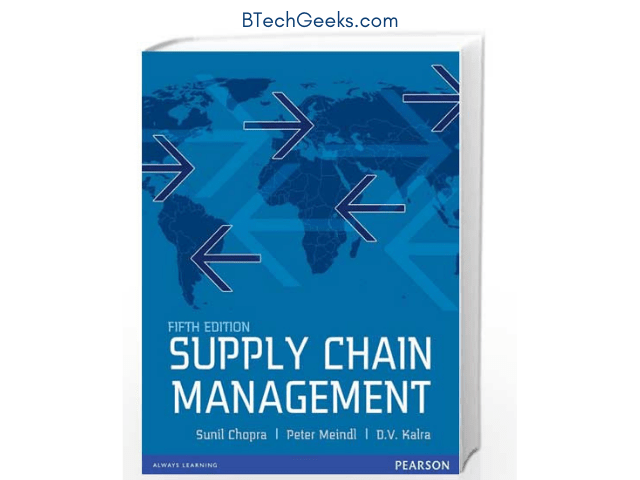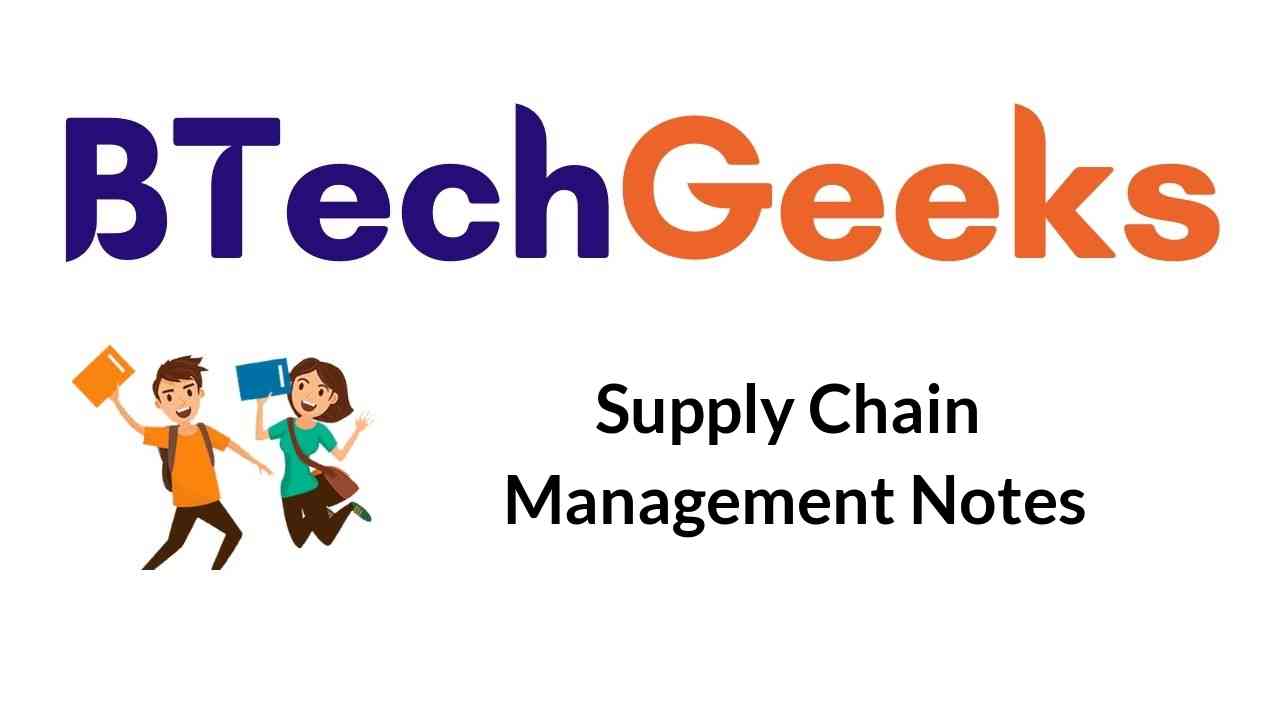Download Supply Chain Management PDF Notes: A supply chain refers to the journey of a product starting from its conception to its sale in the market. It includes all the in-betweens from conception to profit-maximizing sales to the customer.
All businesses have a supply chain because it is the very process through which any industry functions. The idea of commerce and business is to create a product and sell it to the people who demand it, and the supply chain is the way in which this gets done. Thus, Supply Chain Management is a relevant subject of study because it focuses on the management of this entire process.
Supply Chain Management Mba pdf notes and Distribution Lecture Notes are incredibly important for any student studying this course and wanting to get onto this particular career path. Aside from just the notes, we also have the following study materials for Supply Chain Management noted down for the convenience of students.
- Supply Chain Management reference books
- Supply Chain Management curriculum
- List of Supply Chain Management important questions
- FAQs about Supply Chain Management Notes
- Conclusion
- Supply Chain Management Notes For Mba
- Supply Chain Management Pdf Notes For Mba
- Operations And Supply Chain Management Notes Pdf
- Logistics And Supply Chain Management Mba Notes Pdf
- Supply Chain Management Pdf Free Download
- Supply Chain Management Vtu Notes Pdf
Introduction to Supply Chain Management Notes

Supply Chain Management is a fairly simple subject to understand, but it has a lot of nuances that students need to know and have studied very well while sitting for an exam for the subject.
For your advantage, we have listed some Supply Chain Management Notes below for your reference. These Supply Chain Management Notes make it much easier for a student to prepare for an exam. Additionally, with the decreased pressure of needing adequate notes for study, the student will also be able to concentrate on studies better.
MBA Supply Chain Management Lecture Notes Free PDF Download
Supply chain management pdf notes: To define Supply Chain Management, it refers to the flow of goods and services as they transform from raw materials into final products which can be sold in the market. This subject looks solely at the supply side of economics and how it can be made better to attain profit maximization and full utility of the resources at hand.
Supply Chain Management looks at the planning of resources and business strategies to see how best to carry out the process of production. It also looks at sourcing and the procurement of raw materials for the production of goods. Manufacturing, delivering, and even managing returns of defective products and such are also important components of the Supply Chain.
The following is a list of the Supply Chain Management Notes:
- Lecture Notes of Supply Chain Management
- Supply Chain Management – Note
- MBA Supply Chain Management Lectures & Study Notes
- Supply Chain PDF Study Materials
- Supply Chain Management Notes For Mba Pdf
- Supply Chain Management Mba Notes
- Supply Chain Management Lecture Notes Pdf
- Supply Chain Management Books For Mba Pdf
- Supply Chain Management Study Material Pdf
- Logistics And Supply Chain Management Notes For Mba Pdf
- Operations And Supply Chain Management Mba Notes
- Supply Chain Management Notes Pdf Download
Supply Chain Management Reference Books
Reference books provide students with that little bit of extra knowledge that pushes them over the top. Diligently going through reference books for Supply Chain Management along with the Supply Chain Management Notes is what will ensure that you do exceptionally well in an examination.
The following are some helpful Supply Chain Management reference books.
- Supply Chain Management – Text and Cases: Janat Shah
- Supply Chain Management – Strategy Planning and Operation: Sunil Chopra and Peter Meindl
- Principles of Supply Chain Management: Joel Wisner, Keong Leong, and Keah-Choon Tan
- Supply Chain Management – Concept and Cases: Altekar Rahul
- Designing and Managing the Supply Chain – Concepts, Strategies, and Cases: David Simchi-Levi, Edith Simchi-Levi, and Philip Kaminsky
- Business Logistics and Supply Chain Management: Ballou Ronald
- Modelling the Supply Chain: Shapiro Jeremy
Supply Chain Management Curriculum
Before sitting for a test or exam, it is best to ensure that not even a single topic has been missed out. The importance of having an outline of the course with each and every topic of the course listed in it.
For this reason, we have provided below the Supply Chain Management curriculum for all students to devise a study plan according to. It is best to do so because this method of studying ensures that you have not missed out on a topic during your preparations for your exams.
Below, there is the unit-wise and topic-wise breakdown of the Supply Chain Management curriculum.
| Unit | Topics |
| Unit I: Introduction to SC |
|
| Unit II: Strategic Sourcing |
|
| Unit III: SC Network |
|
| Unit IV: Planning Demand, Inventory, and Supply |
|
| Unit V: Current Trends |
|
List of Supply Chain Management Important Questions
No studying process is complete without having solved a list of important questions. Solving all the important questions for a subject ensures that the studying you have done has, in fact, led to learning. Solving a list of important questions without looking at your notes or other study materials can be a very weight lifting and lightening feeling.
We have provided a list of Supply Chain Management important questions so that, once you are done with your studying, you can also sit and solve them to test yourself. In the Supply Chain Management paper, there are 3 kinds of questions – 2 markers, 13 markers, and 15 markers, all of which encompass different parts of the question paper.
Below, we have listed several Supply Chain Management important questions under each set of marks.
2 markers
- What are the Argo supply chains?
- What is a supply chain network?
- Explain make or buy decisions.
- What are the drivers of supply chain performance?
- What is risk pooling?
- List the advantages of worldwide sourcing.
- What is SC restructuring?
- What is value addition?
- Define reverse logistics.
- What is capacity allocation?
13 markers
- Explain the decision phases in SCM.
- Explain the process of creating a global world-class supplier base.
- What is the purpose of SC integration? What are its benefits?
- Explain multiple location inventory management using a suitable example.
- Explain the decision phases in SCM.
- Explain the steps involved in supplier selection.
- Why is it important to consider uncertainty while evaluating SC design decisions?
- What is the impact of risk sharing on supplier performances and information distortion?
- What is the goal of the supply chain? Explain the impact of the supply chain decisions on the success of a firm.
- What are some ways in which a firm such as Wal-Mart benefits from outsourcing decisions?
15 markers
- If a specialty chemical company is considering expanding its operations into Brazil when five companies dominate the consumption of such chemicals, what sort of distribution network should this company decide upon?
- What are the factors to be considered when deciding upon whether to “make and supply” or “buy and supply” blood pressure measuring kits for hospitals in rural areas of India? State assumptions, if any.
- How does supply chain flows affect the success or failure of a firm such as Amazon? List two SC decisions that have a major significance of an impact on SC profitability.
Frequently Asked Questions on Supply Chain Management Course Complete Notes
Question 1.
What are the basic stages one should know about Supply Chain Management?
Answer:
In a Supply Chain, first comes the planning of resources and how a commodity is to be produced or manufactured, or if they will be imported from elsewhere, and other such decisions. Once the planning stage is complete, the next step is sourcing and procurement of raw materials.
Next comes making or manufacturing the product, seeing how much time it takes to produce, finding appropriate storage space, etc. The fourth stage is that of delivery, where the goods are taken to the market to be sold and the best possible price for profit maximization, and herein, ending the Supply Chain.
Question 2.
What are the best Supply Chain Management reference books?
Answer:
The best Supply Chain Management reference books are as follows:
- Supply Chain Management – Text and Cases: Janat Shah
- Supply Chain Management – Strategy Planning and Operation: Sunil Chopra and Peter Meindl
There are also a few other god SCM reference books that have been listed above.
Question 3.
What is the importance of Supply Chain Management?
Answer:
Supply Chain Management has several benefits for the consumer as well as the producer of any commodity. It is beneficial for the producer on the supply side because it hinges on the goal of profit maximization. The optimization of the production process to meet company needs and budgets reduces the costs incurred by the company on the whole and increases the cash flow, thus growing the company as the business grows.
On the consumer side, consumer satisfaction increases because the aim of the company becomes consumer-focused on providing the best goods and services to earn the highest profits.
Question 4.
What is the question paper pattern for a Supply Chain Management exam?
Answer:
The maximum marks to be awarded in a Supply Chain Management exam is 100 marks, which is divided into 3 parts – Part A, Part B, and Part C:
Part A: 10 questions of 2 marks each, all questions are compulsory.
Part B: 5 units of 2 questions carrying 13 marks each (total of 10 questions); students have to answer one question from each unit.
Part C: 2 questions of 15 marks, students have to answer 1 question.
Recommended Reading On: Management Science Notes
Conclusion to the Supply Chain Management and Distribution Notes Free PDF
We have provided you with some great books & notes on Supply Chain Management that should be of good help to you during your exam. To facilitate these Supply Chain Management Notes, we have also provided an adequate list of Supply Chain Management reference books, the curriculum for the subject, and also a list of Supply Chain Management important questions.
This Supply Chain Management Lecture Note is sufficient to help you score wondrously in your examinations. Some of these books & management supply chain notes shall also be adequate for helping you out with your job if you choose Supply Chain Management as a career.

